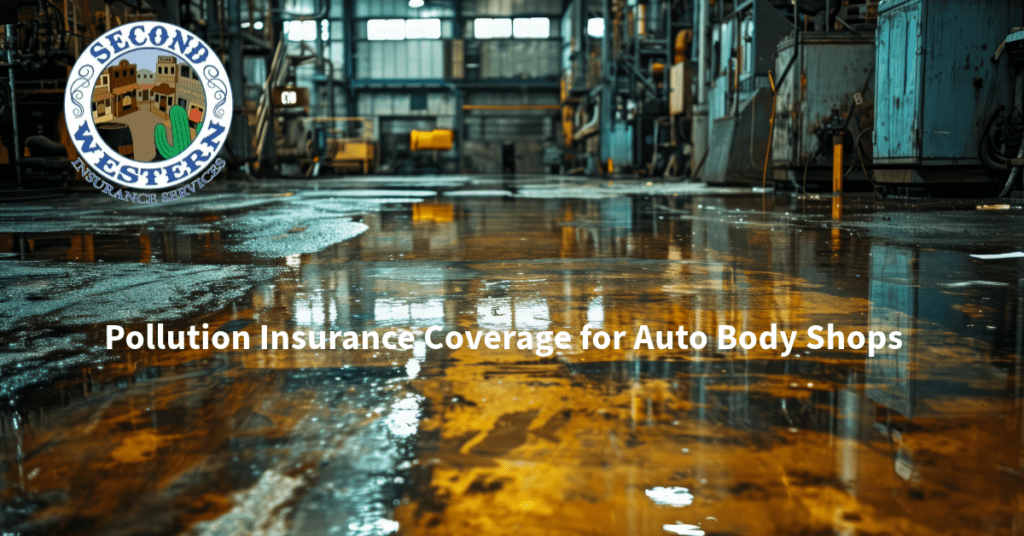Pollution Insurance Coverage for Auto Body Shops

One busy afternoon, Tom, the owner of an auto body shop, discovered that a solvent spill had seeped into the ground near his shop. Panic set in as he realized the potential environmental impact and the financial strain it could cause. He quickly learned that his standard business liability insurance wouldn’t cover the cleanup costs or the potential lawsuits. This incident highlighted a gap in his insurance coverage – one that could have been avoided with proper pollution coverage.
Auto body shops, like Tom’s, deal with hazardous materials daily. From paint thinners to cleaning solvents, these substances pose significant risks if not managed correctly. When a spill or accident occurs, it can create a whole host of problems. Without the right pollution insurance coverage, these costs can be crippling for a small business.
Why Pollution Coverage is Important for Auto Body Shops
Auto body shops face unique risks that require specialized insurance to protect against pollution-related incidents. Regular business liability policies often do not cover environmental damage caused by spills, leaks, or other pollution events. This leaves auto body shops vulnerable to significant financial losses and legal problems. Pollution coverage is essential because it specifically addresses the environmental risks associated with the chemicals and materials used in auto body repairs.
For example, if a spill occurs and contaminates nearby water sources, the shop owner could be held liable for the cleanup costs and any damage caused to surrounding properties. These expenses can quickly add up, reaching tens or even hundreds of thousands of dollars. Pollution insurance coverage can help cover these costs, providing financial protection and peace of mind.
Common Misconceptions about Insurance Coverage for Auto Body Shops
Many auto body shop owners believe that their standard liability insurance will cover all potential risks, including pollution. However, this is not the case. Standard policies typically exclude environmental damages, making it essential to have dedicated pollution coverage. Without this coverage, shop owners may find themselves facing unexpected expenses that could threaten the survival of their business.
Another common misconception is that pollution incidents are rare and unlikely to happen. In reality, even minor spills or leaks can lead to significant environmental damage. For instance, a small amount of paint thinner spilled on the ground can seep into the soil and contaminate groundwater, leading to expensive cleanup efforts. Shop owners need to recognize the potential risks and ensure they have the appropriate coverage.
Coverage for Employee Tools
Another common misconception is that employee-owned tools are covered under the shop’s insurance policy. In reality, most standard policies do not cover personal tools unless specifically added. Shop owners should talk to their insurance providers to make sure these valuable items are protected. Employee tools are essential for the daily operations of an auto body shop, and losing them can disrupt work and lead to costly replacements.
To protect these tools, shop owners can add an endorsement to their existing policy or purchase a separate policy specifically for employee tools. This coverage can help replace tools that are lost, stolen, or damaged, ensuring that employees can continue their work without interruption. By clarifying coverage for employee tools, shop owners can avoid misunderstandings and ensure that their employees’ investments are protected.
Coverage for Customer Cars
Customer cars left at the shop for repairs are also often assumed to be covered under standard policies. However, Garagekeeper’s Insurance is necessary to protect these vehicles from damage while in the shop’s care. Without this specific coverage, shop owners could face significant financial burdens if customer vehicles are damaged. Garagekeeper’s Insurance covers a variety of risks, including theft, fire, vandalism, and weather-related damage.
For example, if a customer’s car is damaged in a fire while at the shop, Garagekeeper’s Insurance would cover the repair or replacement costs. Without this coverage, the shop owner would be responsible for these expenses, which could be substantial. By securing Garagekeeper’s Insurance, shop owners can provide peace of mind to their customers and protect their business from financial loss.
Types of Pollution Coverage for Auto Body Shops
Pollution coverage for auto body shops includes several types of policies:
- Premises Pollution Liability: This policy covers pollution incidents that occur on the shop’s premises, including cleanup costs and third-party claims for bodily injury and property damage. This is essential for protecting the business from the financial impact of spills or leaks that occur within the shop.
- Site Pollution Liability: This coverage is for properties with historical environmental issues, covering past pollution incidents. This is particularly important for shops located in areas with a history of industrial activity, where soil and water contamination may have occurred before the current owner took over.
- Transportation Pollution Liability: This policy protects against pollution incidents that occur while transporting hazardous materials. Auto body shops often transport chemicals and materials to and from their location, and accidents during transit can lead to spills and environmental damage. This coverage ensures that the business is protected even when materials are in transit.
- Non-owned Disposal Sites Coverage: This coverage protects against liabilities from waste disposal at third-party sites. Auto body shops generate waste that must be disposed of properly. If a third-party disposal site mishandles the waste and causes pollution, this coverage protects the shop from associated liabilities.
Additional Relevant Insurance Policies
In addition to pollution coverage, auto body shops should consider other relevant insurance policies to ensure complete protection:
- Garagekeeper’s Insurance: Covers customer vehicles while in the shop’s custody. This coverage is crucial for protecting against risks that could damage customer vehicles, such as theft, fire, or vandalism. Without this coverage, shop owners could face significant financial burdens if customer vehicles are damaged.
- Business Interruption Insurance: Provides financial assistance if the shop needs to close temporarily due to a covered loss. This coverage helps cover lost income and ongoing expenses during the closure, allowing the business to recover without severe financial strain.
- Employee Practices Liability Insurance (EPLI): Covers claims related to wrongful employment practices. This includes claims of discrimination, harassment, or wrongful termination. EPLI helps protect the business from costly legal battles and potential settlements.
- Cyber Liability Insurance: Protects against risks associated with digital operations, such as data breaches. In today’s digital age, auto body shops may store sensitive customer information electronically. Cyber liability insurance helps cover the costs associated with data breaches, including notification expenses, legal fees, and credit monitoring for affected customers.
Understanding Policy Language and Exclusions
It is important for auto body shop owners to thoroughly review and understand their insurance policies. This includes knowing what is covered, the limits of coverage, and any exclusions that may apply. For example, some policies may exclude certain pollutants or only cover sudden pollution incidents. Understanding these details helps shop owners ensure they have the right coverage for their specific risks.
When reviewing policy language, shop owners should pay attention to the definitions of key terms, such as “pollutant” and “occurrence.” These definitions can significantly impact what is covered under the policy. Additionally, understanding the policy’s exclusions is crucial. Common exclusions in pollution coverage may include pre-existing conditions, known pollution incidents, and gradual pollution events.
Cost of Pollution Remediation
Pollution incidents can lead to significant financial costs, including:
- Emergency Response: Immediate containment and assessment. Quick action is often required to prevent further environmental damage and to comply with regulatory requirements. Emergency response costs can include hiring specialized cleanup crews and equipment.
- Cleanup Costs: Removing and disposing of pollutants. This involves the physical removal of contaminated soil or water, as well as the proper disposal of hazardous materials. Cleanup costs can vary widely depending on the extent of the contamination and the methods required for remediation.
- Restoration: Returning the affected area to its pre-incident condition. This may involve restoring vegetation, repairing infrastructure, and ensuring that the area is safe for use. Restoration costs can be substantial, particularly if the pollution has caused significant damage to the environment.
- Legal and Consultant Fees: Navigating legal and environmental consulting expenses. Pollution incidents often involve complex legal and regulatory issues. Hiring legal and environmental experts to navigate these challenges can be costly.
Fines and Penalties for Non-Compliance
Non-compliance with environmental regulations can result in substantial fines and penalties, including:
- Regulatory Fines: Penalties for failing to meet environmental standards. These fines can be imposed by local, state, or federal agencies and can vary based on the severity of the violation.
- Non-Compliance Costs: Expenses related to addressing regulatory issues. This can include costs associated with bringing the business into compliance, such as upgrading equipment or changing operating procedures.
- Litigation: Legal costs from third-party or government actions. Pollution incidents can lead to lawsuits from affected parties or regulatory agencies. Legal fees and potential settlements can be financially devastating for a business.
Second Western Puts Your Business First
At Second Western Insurance, we help auto body shops in LA County and beyond protect themselves from a wide range of risks, including pollution incidents. Our team is dedicated to providing tailored insurance solutions that fit the unique needs of each business.
We offer comprehensive pollution coverage, as well as other relevant policies such as Garagekeeper’s Insurance, Property Insurance, Directors and Officers coverage, and Cyber Liability Insurance, and more. Contact us today to learn more about our pollution coverage and other insurance options for auto body shops.
